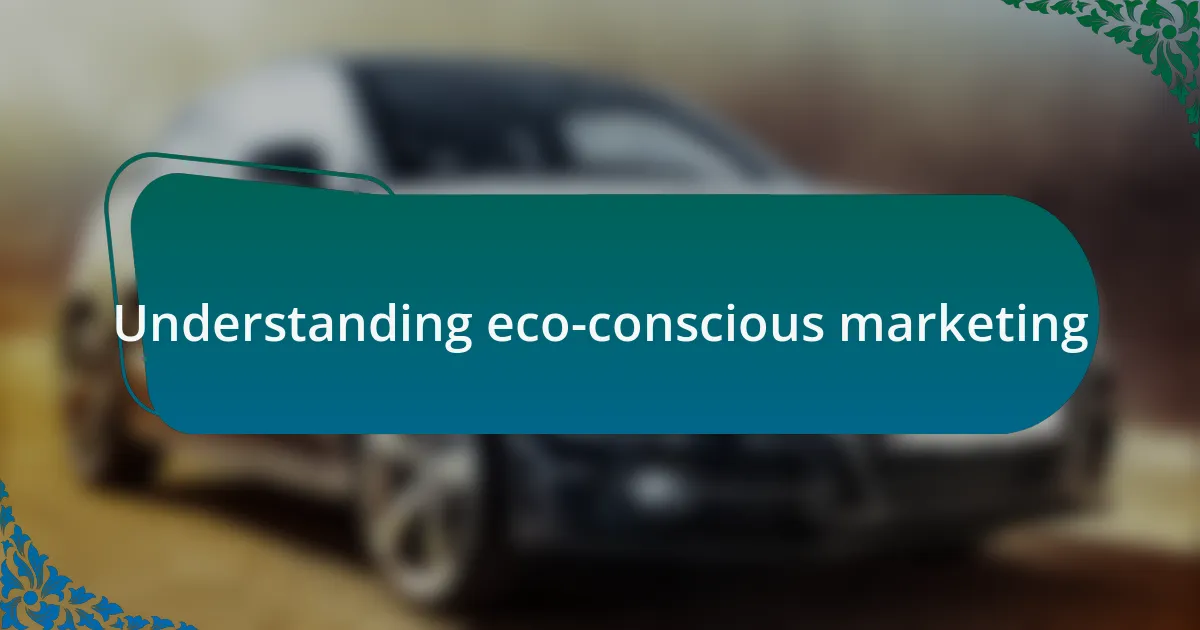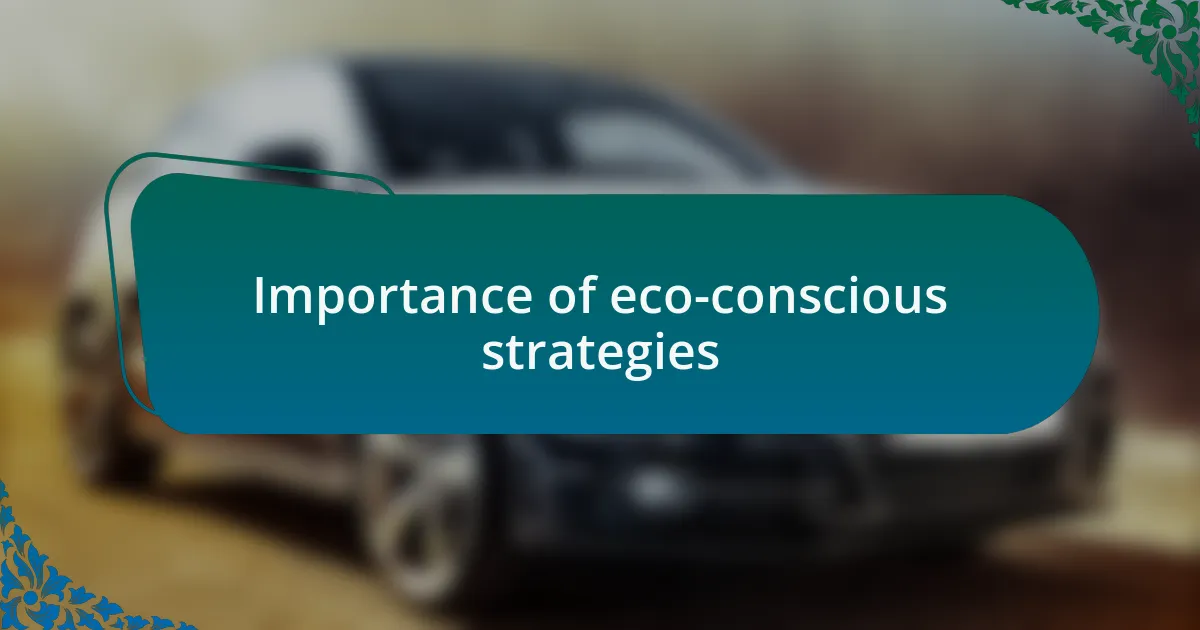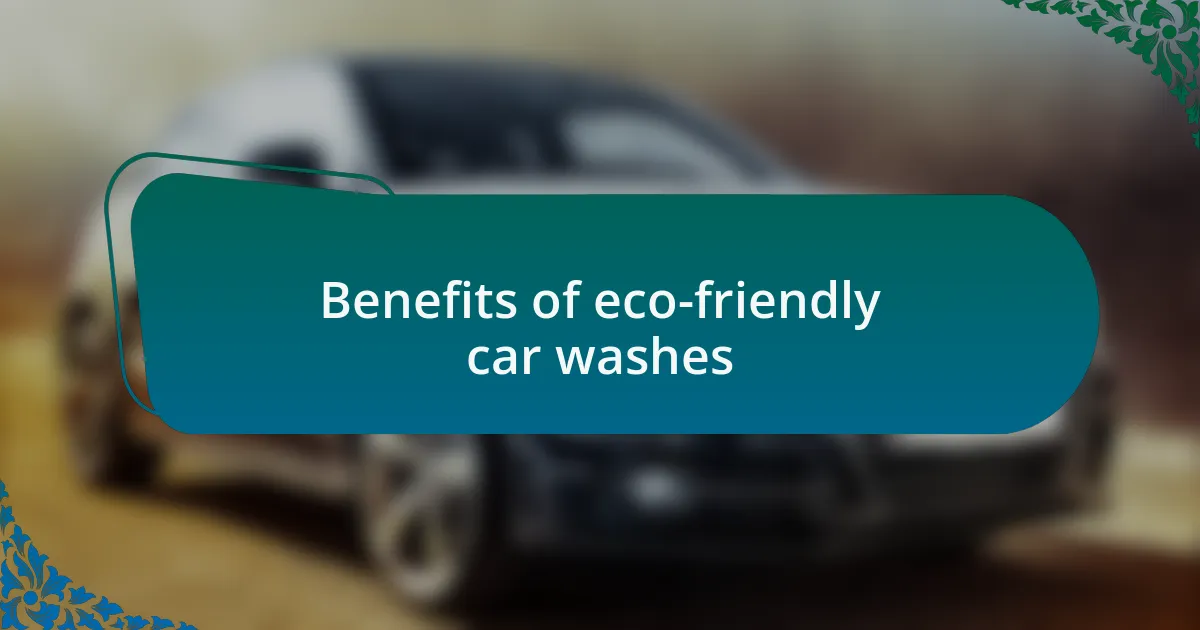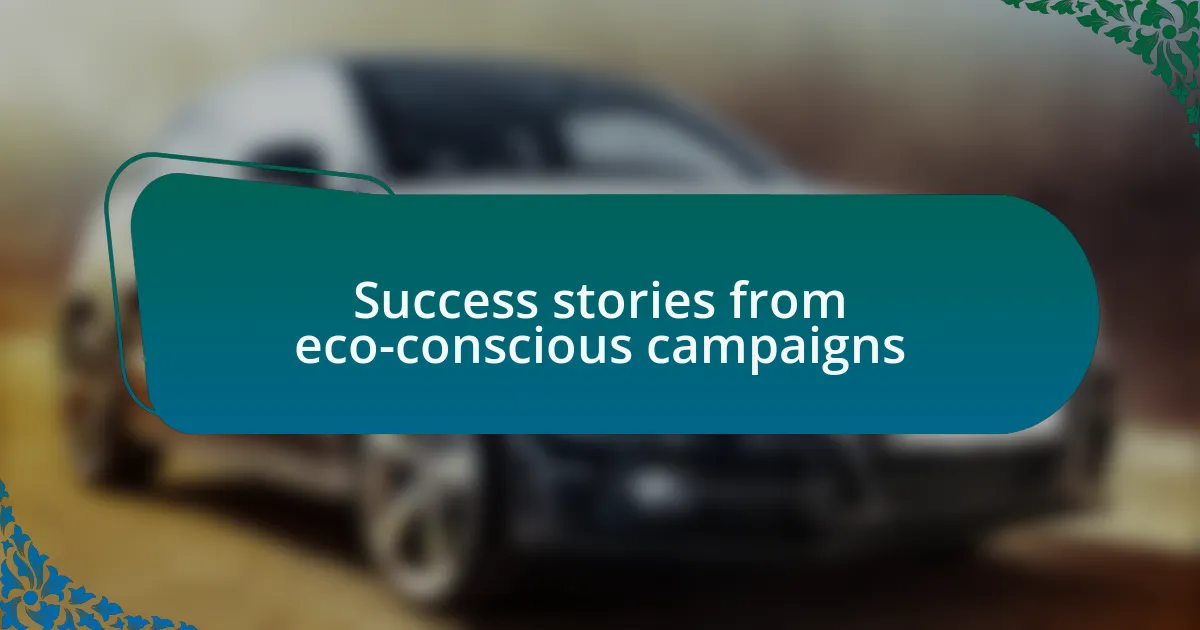Key takeaways:
- Eco-conscious marketing requires authenticity and transparency to genuinely connect with consumers and foster brand loyalty.
- Engaging customers in two-way dialogues about sustainability enhances community trust and shared values.
- Successful eco-conscious campaigns can lead to increased customer engagement and financial benefits while promoting environmental stewardship.
- Consistency in messaging and practices is crucial for building customer trust and effectively conveying a brand’s commitment to sustainability.

Understanding eco-conscious marketing
Eco-conscious marketing is all about aligning a brand’s values with the growing demand for sustainability. From my experience, this approach goes beyond merely promoting green products; it involves a genuine commitment to minimizing environmental impact. I often ask myself, how can businesses authentically convey their eco-friendly practices without coming off as insincere? It’s a tightrope walk that requires transparency and authenticity.
One memorable moment for me was when I attended a marketing conference where a speaker discussed the power of storytelling in eco-conscious campaigns. He emphasized how sharing real stories about the environmental benefits of a product or service can resonate deeply with consumers. I found myself reflecting on my own practices—how often do I share the behind-the-scenes efforts my business makes in reducing waste? It was a revelation that left me motivated to rethink my marketing narrative.
Furthermore, engaging with customers in a two-way dialogue about sustainability can strengthen their loyalty. I’ve seen how businesses that invite feedback on their eco-friendly initiatives not only enhance their credibility but also foster a community around shared values. It raises the question: when was the last time you asked your audience how your environmental efforts could improve? This kind of connection not only boosts brand loyalty but creates a shared mission for a more sustainable future.

Importance of eco-conscious strategies
Eco-conscious strategies are crucial in today’s market landscape because consumers are increasingly making choices based on a brand’s environmental impact. I remember when I first realized how much customers appreciated a commitment to sustainability; I started incorporating eco-friendly products into our car wash services, and the feedback was overwhelmingly positive. It made me ponder, how often do we undervalue the power of being environmentally aware?
Moreover, implementing these strategies helps differentiate a business in a competitive marketplace. I vividly recall a conversation with a potential client who was comparing several car wash options. What swayed their decision was not just the quality of our services but our transparent practices around water usage and biodegradable products. This experience illustrated that eco-conscious marketing isn’t just beneficial for the planet; it also creates a compelling narrative that attracts eco-minded clients.
Additionally, eco-conscious strategies foster a deeper emotional connection with consumers. When I shift the focus of my marketing to highlight our commitment to sustainability, I see my customer engagement soar. It raises a crucial question: how can we create a meaningful relationship with our audience rather than just transactions? Sharing our journey towards sustainability doesn’t just inform; it inspires, leading to a more loyal customer base that feels part of something bigger.

Benefits of eco-friendly car washes
One significant benefit of eco-friendly car washes is the positive impact on local ecosystems. I recall cleaning up an area around our wash and discovering how many aquatic plants thrived in the nearby stream. By using biodegradable soaps and protecting water sources, we contribute to the health of our environment. Isn’t it reassuring to know that your car washing routine can help nourish nature rather than harm it?
Another advantage is the cost savings associated with utilizing water-efficient systems. In my experience, adopting technologies that recirculate water drastically reduced our consumption and utility costs. It sparked a wave of curiosity among my staff about how we could leverage innovative solutions to enhance both sustainability and profitability. Have you considered how much you could save by simply choosing a more eco-conscious method?
Lastly, eco-friendly car washes often create a sense of community among customers who value sustainability. I remember hosting an open house where we showcased our green practices, and the turnout was inspiring. It felt amazing to connect with patrons who shared a vision for a healthier planet. This shared commitment not only enhances customer loyalty but also fosters a collective effort towards environmental preservation. Wouldn’t it be great to be part of a movement that champions both car care and ecological responsibility?

My journey with sustainable practices
Embracing sustainable practices has been a transformative journey for me. I still vividly remember the first time I made the switch to eco-friendly cleaning products at our car wash. The initial hesitation was palpable; would these alternative products perform as well? To my surprise, not only did they exceed my expectations, but they also sparked a newfound excitement among my team. It felt like we were part of something bigger, and I couldn’t help but feel a sense of pride in taking a step towards a greener future.
As I delved deeper into sustainability, I began to explore ways to reduce our energy consumption. One memorable experience was upgrading our lighting to energy-efficient LEDs. The moment we flipped the switch, the vibrant atmosphere changed, and I instantly felt energized myself. Have you ever experienced that rush of accomplishment when doing something good for the planet? It was in those moments of transformation that I realized how impactful small changes can be on both our operation and the environment.
Developing a sustainable culture within the workplace was not just about implementing practices; it was also about inspiring a mindset change. I recall organizing weekly team meetings where we shared stories about our experiences with eco-friendly initiatives. One of my staff members shared how his young daughter inspired him to make more conscious choices. It reminded me that our work transcends just washing cars; we are nurturing the values that will shape future generations. Isn’t it incredible how sustainability can weave its way into the fabric of our daily lives?

Success stories from eco-conscious campaigns
Successful eco-conscious campaigns can yield remarkable results that extend beyond environmental benefits. For instance, I remember a neighboring car wash that introduced a water-saving system, which not only reduced their water usage significantly but also attracted environmentally aware customers. It was heartening to see how they turned a challenge into an opportunity, and I couldn’t help but feel inspired by their commitment to sustainable practices.
Another inspiring example came from a local car wash that partnered with a tree-planting organization. For every wash, they donated a portion of their profits toward planting trees. The community response was astounding; customers felt they were contributing to a greater cause. It was awesome to witness how combining a passion for cleanliness with environmental stewardship led to both increased sales and a positive emotional connection with the community.
I also recall a campaign that involved social media engagement, where customers were encouraged to share their eco-friendly car care tips. This not only created a community of like-minded individuals but also showcased the car wash’s commitment to sustainability. The vibrant discussions and shared experiences made the campaign feel personal and relatable. Isn’t it fascinating how a simple conversation can create a ripple effect of positive change and drive brand loyalty?

Lessons learned from my experience
One of the key lessons I learned is the value of authenticity in eco-conscious marketing. There was a time when I tried to promote a green initiative without fully understanding its impact. I didn’t realize that customers can sense insincerity; they can tell when a message is just a marketing ploy. When I shifted towards genuine practices, like sourcing eco-friendly cleaning products and explaining their benefits, I noticed an immediate, positive response from my customers.
Another important insight came from interacting with customers directly during campaign events. I once hosted a “green day” where folks could wash their cars while learning about sustainable practices. I was surprised by the depth of engagement. Many shared their own stories of environmental challenges, which made me rethink our approach to communication. How often do we listen to our customers’ experiences? This open dialogue deepened our community connection and fostered loyalty, proving that sharing a common cause can be a powerful marketing strategy.
Lastly, the significance of consistent messaging struck me profoundly. I ventured into a campaign emphasizing reducing plastic waste, but then our promotional materials arrived filled with plastic. It was a glaring contradiction that felt like a personal failure. This experience taught me the importance of ensuring all aspects of a business reflect its eco-conscious values. I now see coherence between actions and messages as crucial in building trust with customers. It’s a lesson I carry with me in every campaign I develop.